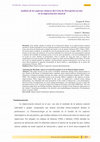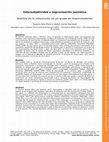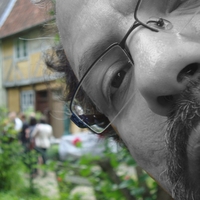Papers by Joaquín Blas Pérez
Investigación Joven, 2020
El taller fue propuesto y coordinado por les investigadores del Programa de Retención de Doctores... more El taller fue propuesto y coordinado por les investigadores del Programa de Retención de Doctores de la UNLP.

Resumen: Este trabajo aborda el estudio de la interacción rítmica en la improvisación musical jaz... more Resumen: Este trabajo aborda el estudio de la interacción rítmica en la improvisación musical jazzística. Desde la perspectiva de la cognición musical corporeizada se describe a la improvisación como una forma de interacción ecológica del músico con su entorno (Johnson 2007; Clarke, 2005). Se recurre para su análisis, al concepto de ciclo de percepción-acción (Leman, 2008) y se define al mismo en tres fases que incluyen: (i) la acción realizada en la ejecución; (ii) la percepción corporal y auditiva del resultado de la propia acción y/o la de otros ejecutantes; y (iii) la reconfiguración de la acción en curso durante la performance. Para el estudio de estas tres fases se realiza un experimento en el que un grupo de músicos improvisa sobre una base MIDI de jazz-blues. El modo en el que los improvisadores se adaptan y posteriormente ajustan rítmicamente con la base en un nivel micro-temporal se describe recurriendo al marco teórico y metodológico de la teoría del entrainment (Clayton, 2005). Palabras-clave: Improvisación-Cognición Corporeizada-Entrainment Analyzing the Rhythmic Aspects of Action-Perception Cycle in Musical Improvisation Abstract: This paper focuses on the study of rhythmic interaction during music improvisation in jazz. Based on the theory of embodied music cognition, music improvisation is characterized as an interactive ecological exchange between the music and the environment (Johnson 2007; Clarke, 2005). The concept of perception-action cycle (Leman 2008) is applied to the analysis of music improvisation. Three stages are defined in this cycle: (i) improviser´s realized action during performance; (ii) embodied and aural perception of the result of improviser´s own performance; and (iii) action reconfiguration on course during performance. An experiment was run to study the perception-action cycle. A group of improvisers improvised along a jazz-blues MIDI base. The way musicians adapt their microtiming rhythmic adjustment to changes in the temporal organization of the stimuli is described according to the theoretic and methodological framework of entrainment theory (Clayton, 2005)

In previous studies (Pérez and Martínez, 2012) improvisation is described from the perspective of... more In previous studies (Pérez and Martínez, 2012) improvisation is described from the perspective of the subject, as an embodied and ecological experience of interaction with the environment (Leman, 2008). In this paper, in a different way improvisation is understood from an intersubjective perspective that goes beyond individual cognitive processes. This means understanding interaction as social cognition (De Jaegher and DiPaolo, 2007) and communicative musicality (Malloch 1999/2000; Trevarthen 1999/2000; Gratier, 2008). Thus, it is in the music group interaction that emerges improvisation as experience of musical shared meaning. For the study, an experiment with groups of two improvisers is presented. The musicians play together with a MIDI backing-track that simulates a jazz ensamble. This base is composed to evaluate the response of both improvisers to an event that breaks their expectations. Especially those connected with the harmonic structure and the orienting-oriented relationships between musicians and between musicians and the base. The improvisations are analyzed in order to describe the harmonics aspects of interaction in terms of 'tonal groove'. This concept represents metaphorically an expressive and co-constructed pitch dynamic space.










Uploads
Papers by Joaquín Blas Pérez